-
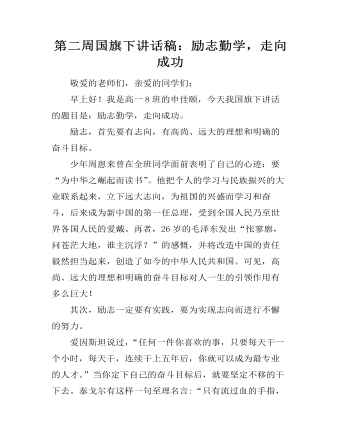
第二周国旗下讲话稿:励志勤学,走向成功
敬爱的老师们,亲爱的同学们:早上好!我是高一8班的申佳颐,今天我国旗下讲话的题目是:励志勤学,走向成功。励志,首先要有志向,有高尚、远大的理想和明确的奋斗目标。少年周恩来曾在全班同学面前表明了自己的心迹:要“为中华之崛起而读书”。他把个人的学习与民族振兴的大业联系起来,立下远大志向,为祖国的兴盛而学习和奋斗,后来成为新中国的第一任总理,受到全国人民乃至世界各国人民的爱戴。再者,26岁的毛泽东发出“怅寥廓,问苍茫大地,谁主沉浮?”的感慨,并将改造中国的责任毅然担当起来,创造了如今的中华人民共和国。可见,高尚、远大的理想和明确的奋斗目标对人一生的引领作用有多么巨大!其次,励志一定要有实践,要为实现志向而进行不懈的努力。爱因斯坦说过,“任何一件你喜欢的事,只要每天干一个小时,每天干,连续干上五年后,你就可以成为最专业的人才。”当你定下自己的奋斗目标后,就要坚定不移的干下去。泰戈尔有这样一句至理名言:“只有流过血的手指,才能弹出世间的绝唱,只有经历过地狱般的磨练,才能练出创造天堂的力量。”学习理应如此。
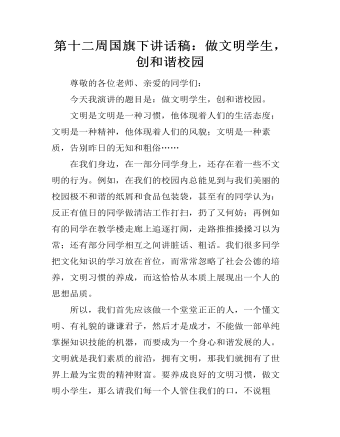
第十二周国旗下讲话稿:做文明学生,创和谐校园
尊敬的各位老师、亲爱的同学们:今天我演讲的题目是:做文明学生,创和谐校园。文明是文明是一种习惯,他体现着人们的生活态度;文明是一种精神,他体现着人们的风貌;文明是一种素质,告别昨日的无知和粗俗……在我们身边,在一部分同学身上,还存在着一些不文明的行为。例如,在我们的校园内总能见到与我们美丽的校园极不和谐的纸屑和食品包装袋,甚至有的同学认为:反正有值日的同学做清洁工作打扫,扔了又何妨;再例如有的同学在教学楼走廊上追逐打闹,走路推推搡搡习以为常;还有部分同学相互之间讲脏话、粗话。
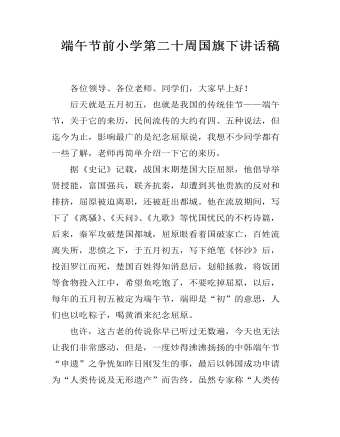
端午节前小学第二十周国旗下讲话稿
各位领导、各位老师、同学们,大家早上好!后天就是五月初五,也就是我国的传统佳节——端午节,关于它的来历,民间流传的大约有四、五种说法,但迄今为止,影响最广的是纪念屈原说,我想不少同学都有一些了解,老师再简单介绍一下它的来历。据《史记》记载,战国末期楚国大臣屈原,他倡导举贤授能,富国强兵,联齐抗秦,却遭到其他贵族的反对和排挤,屈原被迫离职,还被赶出都城。他在流放期间,写下了《离骚》、《天问》、《九歌》等忧国忧民的不朽诗篇,后来,秦军攻破楚国都城,屈原眼看着国破家亡,百姓流离失所,悲愤之下,于五月初五,写下绝笔《怀沙》后,投汨罗江而死,楚国百姓得知消息后,划船拯救,将饭团等食物投入江中,希望鱼吃饱了,不要吃掉屈原,以后,每年的五月初五被定为端午节,端即是“初”的意思,人们也以吃粽子,喝黄酒来纪念屈原。也许,这古老的传说你早已听过无数遍,今天也无法让我们非常感动,但是,一度炒得沸沸扬扬的中韩端午节“申遗”之争恍如昨日刚发生的事,最后以韩国成功申请为“人类传说及无形遗产”而告终。虽然专家称“人类传说及无形遗产”是全人类共享的,我们的文化传统被别国认同,并非坏事。但毕竟“端午节”一词还是被别国抢先一步给端走了。
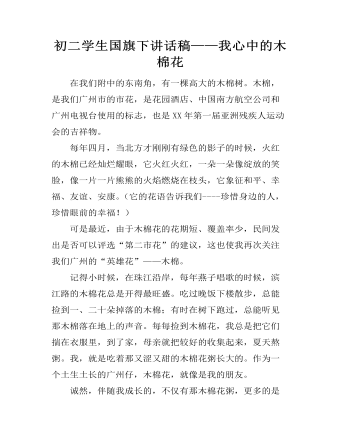
初二学生国旗下讲话稿——我心中的木棉花
在我们附中的东南角,有一棵高大的木棉树。木棉,是我们广州市的市花,是花园酒店、中国南方航空公司和广州电视台使用的标志,也是XX年第一届亚洲残疾人运动会的吉祥物。每年四月,当北方才刚刚有绿色的影子的时候,火红的木棉已经灿烂耀眼,它火红火红,一朵一朵像绽放的笑脸,像一片一片熊熊的火焰燃烧在枝头,它象征和平、幸福、友谊、安康。(它的花语告诉我们----珍惜身边的人,珍惜眼前的幸福!)可是最近,由于木棉花的花期短、覆盖率少,民间发出是否可以评选“第二市花”的建议,这也使我再次关注我们广州的“英雄花”——木棉。记得小时候,在珠江沿岸,每年燕子唱歌的时候,滨江路的木棉花总是开得最旺盛。吃过晚饭下楼散步,总能捡到一、二十朵掉落的木棉;有时在树下跑过,总能听见那木棉落在地上的声音。每每捡到木棉花,我总是把它们揣在衣服里,到了家,母亲就把较好的收集起来,夏天熬粥。我,就是吃着那又涩又甜的木棉花粥长大的。作为一个土生土长的广州仔,木棉花,就像是我的朋友。
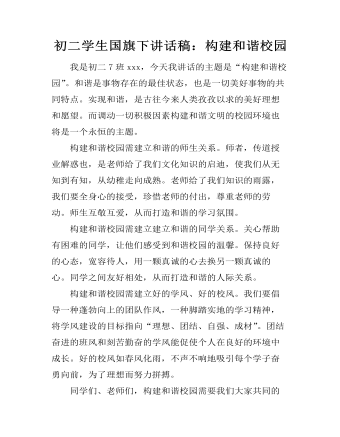
初二学生国旗下讲话稿:构建和谐校园
我是初二7班xxx,今天我讲话的主题是“构建和谐校园”。和谐是事物存在的最佳状态,也是一切美好事物的共同特点。实现和谐,是古往今来人类孜孜以求的美好理想和愿望。而调动一切积极因素构建和谐文明的校园环境也将是一个永恒的主题。构建和谐校园需建立和谐的师生关系。师者,传道授业解惑也,是老师给了我们文化知识的启迪,使我们从无知到有知,从幼稚走向成熟。老师给了我们知识的雨露,我们要全身心的接受,珍惜老师的付出,尊重老师的劳动。师生互敬互爱,从而打造和谐的学习氛围。构建和谐校园需建立建立和谐的同学关系。关心帮助有困难的同学,让他们感受到和谐校园的温馨。
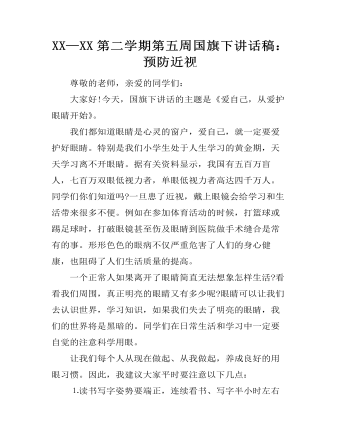
XX—XX第二学期第五周国旗下讲话稿:预防近视
尊敬的老师,亲爱的同学们:大家好!今天,国旗下讲话的主题是《爱自己,从爱护眼睛开始》。我们都知道眼睛是心灵的窗户,爱自己,就一定要爱护好眼睛。特别是我们小学生处于人生学习的黄金期,天天学习离不开眼睛。据有关资料显示,我国有五百万盲人,七百万双眼低视力者,单眼低视力者高达四千万人。同学们你们知道吗?一旦患了近视,戴上眼镜会给学习和生活带来很多不便。例如在参加体育活动的时候,打篮球或踢足球时,打破眼镜甚至伤及眼睛到医院做手术缝合是常有的事。形形色色的眼病不仅严重危害了人们的身心健康,也阻碍了人们生活质量的提高。一个正常人如果离开了眼睛简直无法想象怎样生活?看看我们周围,真正明亮的眼睛又有多少呢?眼睛可以让我们去认识世界,学习知识,如果我们失去了明亮的眼睛,我们的世界将是黑暗的。同学们在日常生活和学习中一定要自觉的注意科学用眼。
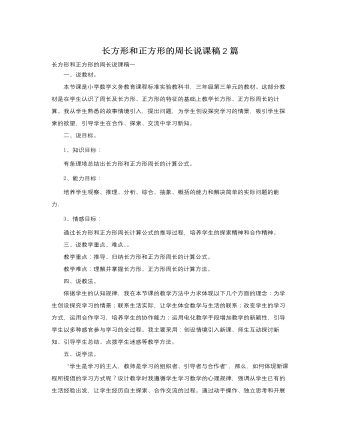
人教版新课标小学数学三年级上册长方形和正方形的周长说课稿2篇
教学活动是师生互动、生生互动的过程,传统的教,将让位于学生的学,学生才是学习的主人,一切只有从学生出发,才能有效的促进教学,才能有效的促进学生的发展。教师要为学生创造一个自主、探索的空间。根据教材的特点及学生的认知规律,我运用电教手段,在学生自主探究、小组合作、教师引导的学习方式中进行教学。问题是数学的心脏,数学思维的过程就是不断地提出问题和解决问题的过程,因此,在数学课堂教学中,教师或提出问题设置悬念,以唤起学生的学习需要,激发兴趣;或设计问题串层层深入突破难点;或拓展问题使学生加深对概念的理解;或提出如何归纳小结整理新知的问题,总之,在课堂中教师及时地向学生提出新的数学问题。为更深入地进行数学思维活动提供动力和方向,使数学思维活动持续不断地向前发展。

人教版高中语文必修3《马嵬(其二)》教案2篇
结合历史自古以来,江山美人历来都是引无数英雄豪杰竞折腰的,如果说英雄选择了美人却丢了江山,把所有罪名都归结于“女人是祸水”。但是,纣王无道,和有了妲己有必然的联系吗?有人说妲己坏透了,坏透了的妲己如果不是取得纣王的信任是坏不起来的,纣王听信了妲己的谗言,听与不听决定权在纣王,而不在妲己。强势永远在纣王一边。再来看看西施和杨贵妃:西施是作为越国贡献给吴国的供品来到吴王夫差的身边的,杨贵妃更是先是李隆基的儿媳妇被看中而得宠的。所以,西施和杨贵妃这两个可怜的女人根本没有自己的独立选择,没有独立的爱情,如果没有西施,就会有南施,或北施;如果没有杨贵妃,就会有李贵妃,王贵妃,总之什么施,什么妃是不能少的,因为那是吴王和李隆基的需要。

新人教版高中英语必修2Unit 1 Cultural Heritage-Discovering Useful Structure教案二
This theme of the part is “ Describe people or things in greater detail”. Students have learned the grammar(restrictive relative clauses) in Book 1, and further review and consolidate its structure “prep+relative pronouns(which/whom)” and the relative adverbs(when, where and why), besides students should understand its form, meaning and functions. In this section, students should be able to express the grammar correctly in daily communication and in the writing. 1. Review the basic usages of relative pronouns and adverbs of attributive clauses . 2. Learn to use some special cases about restrictive relative clauses.3. Learn to write sentences with restrictive relative clauses flexibly according to the context.1. Review the basic usages of relative pronouns and adverbs of attributive clauses .2. Learn to use some special cases about restrictive relative clauses.3. Learn tow rite sentences with restrictive relative clauses flexibly according to the context.Step 1. Observe the following sentences, and mark the relative pronouns and the adverbs. 1. After listening to the scientists who had studied the problems, and citizens who lived near the dam, the government turned to the United Nations for help.2. Temples and other cultural sites were taken down piece by piece, and then moved and put back together again in a place where they were safe from the water.Step 2 PracticePlease complete these sentences with relative pronouns and relative adverbs and answer the following questions.Questions: 1. What is the head noun ?2. What relative words should be used ?3. What elements do they act in these sentences ?

新人教版高中英语必修2Unit 2 Wildlife Protection-Reading for Writing教案二
This lesson aims at making a poster about protecting wildlife after reading some posters. During reading students are guided to understand the content and try to summarize the posters with one sentence. Then students are guided to try to make a poster about protecting wildlife.1. Read the two posters and try to understand the summary sentences.2. Look at the two posters and try to understand what emotions they express.3. Try to summarize the features of posters4. Try to make a poster about wildlife.1. Look at the two posters and try to understand what emotions they express.2. Try to summarize the features of posters3. Try to make a poster about wildlife.Step 1 Lead inLook at the the posters on the textbook and ask:Which emotions do the posters communicate ?Step 2 Read the poster and answer the questions.1. What do you think of the animals in the poster on the left ?I think it is frightening and ugly.2. Why do we should protect the ugly animals ?All species--the good, the bad, and the ugly-- should be treated equally.The world needs all kinds--without variety, our planet cannot survive.3. Why are billions of trees being cut down every year ?To make paper for humans.4. What result will be lead to after the trees are cut down ?A lost of animal homes are being destroyed./The habitat of wildlife is being destroyed.Step 3 Find the feature of posters1. What does each poster use to stir up emotions ?On the left, it makes us a little frightened and it looks a little ugly, but it can activate our curiosity--What is it? And What is wrong with it?On the right, it makes us feel a little sad and want to protect them.

新人教版高中英语必修2Unit 1 Cultural Heritage-Reading and Thinking教案二
1. This section focuses on "Understanding how a problem was solved”, which is aimed to guide students to analyze and discuss the challenges and problems faced by cultural heritage protection during the construction of Aswan Dam, as well as the solutions. On the basis of understanding, students should pay attention to the key role of international cooperation in solving problems, and attach importance to the balance and coordination between cultural heritage protection and social and economic development. Students are encouraged to face challenges actively, be good at cooperation, and make continuous efforts to find reasonable ways and means to solve problems.2. Enable students to understand the main information and text structure of the reading text;3. Motivate students to use the reading strategy "make a timeline" according to the appropriate text genre;4. Enable students to understand how a problem was solved;5. Enable students to understand the value of protecting cultural heritage by teamwork and global community;1. Guide students to pay attention to reading strategies, such as prediction, self-questioning and scanning.2. Help students sort out the topic language about protecting cultural relics and understand the narrative characteristics of "time-event" in illustrative style3. Lead students to understand the value of protecting cultural heritage by teamwork and global community;

新人教版高中英语必修2Unit 2 Wildlife Protection-Discovering Useful Structure教案二
2.表示现阶段正在进行的被动动作(该动作在说话的瞬间未必正在进行)。Many interesting experiments are being carried out these days.(说话时,并不一定正在进行)3.表示一种经常性的被动行为,常和always,constantly 等表示频度的副词连用,这种用法常常带有赞扬或厌恶的感情色彩。He is always being praised by the leader.4.表示按计划或安排主语将要承受谓语动词所表示的动作(仅限于少数及物动词)。A party is being held tonight.Step 4 Special cases1.像take care of, look after, talk about, think of等动词与介词构成的短语用于现在进行时的被动语态时, 其中的介词不可省略。The ways to stop illegally hunting are being talked about. 2.可与部分情态动词连用,表示对正在发生的事情的推测。She may be being punished by her mother.3.有时可表示按计划或安排将要进行的一个被动动作。A celebration is being held this weekend for his success.4.某些表示“状态、心理活动、存在”等的动词,如have,want,need,love,一般不用现在进行时的被动语态,而常用一般现在时的被动语态。With the population increasing,more land is needed.5.“be+under/in+n.”可表示现在进行时的被动意义。My computer is under repair.=My computer is being repaired.

新人教版高中英语必修2Unit 2 Wildlife Protection-Reading and Thinking教案二
The theme of this unit is human and nature, focusing on the theme of wildlife protection. Nature is a complex ecosystem, in which there are delicate balance between animals and plants. Because of the role of the food chain, the extinction of one species will produce influence, causing a series of chain reaction. Large scale extinction of species will have a serious and even irreversible impact on the ecosystem, resulting in immeasurable losses. Therefore, it is of great significance to protect wild species. To protect wild species is to protect human beings themselves. The motto of this unit is "when the buying stops, the killing can too,” which is a public service advertising slogan to protect wildlife. It tells people that every rhinoceros horn, every fur, every bowl of shark fin soup, every Ivory product, and every tiger bone product, etc. consumed by human beings, are innocent wild animals slaughtered behind them. The mission of wild aid is to ban illegal trade in endangered wildlife and mitigate climate change. It aims to educate the public to reduce the consumption demand for endangered wildlife products through public publicity and improve the awareness of environmental protection.1. Improve the awareness of wildlife protection by acquiring the knowledge of wildlife protection.2. Focus on environmental protection and protection of all lives.3. Analysis of the living environment of wild animals with appropriate thinking mode.4. Skillfully use the vocabulary and grammar knowledge of this unit to cultivate self-study ability according to the unit content5. Develop cooperative learning ability through discussion and other ways1. Enable the Ss to talk about the current situation of wild animals.2. Guide the Ss to summarize the main idea of each paragraph as well as the main idea of the text.

新人教版高中英语必修2Unit 3 The Internet-Discovering Useful Structure教案二
This teaching period mainly deals with grammar “The Present Perfect Passive Voice.” To begin with, teachers should lead students to revise what they have learned about the Present Perfect Passive Voice. And then, teachers move on to stress more special cases concerning this grammar。This period carries considerable significance to the cultivation of students’ writing competence and lays a solid foundation for the basic appreciation of language beauty. The teacher is expected to enable students to master this period thoroughly and consolidate the knowledge by doing some exercises. 1. Guide students to review the basic usages of the Present Perfect Passive Voice2. Lead students to learn to use some special cases concerning the Present Perfect Passive Voice flexibly.2. Enable students to use the basic phrases structures flexibly.3. Strengthen students’ great interest in grammar learning.1. Help students to appreciate the function of the Present Perfect Passive Voice in a sentence2. Instruct students to write essays using the proper the Present Perfect Passive Voice.观察下列句子特点,总结共同点。1.(教材P28)Much has been written about the wonders of the World Wide Web.2.(教材P28)But the Internet has done much more for people than simply make life more convenient.3.(教材P28)Many people have been helped by the club.4.(教材P28)She no longer feels lonely, and her company has become quite successful.5.(教材P32)Today I thought I’d blog about a question that has been asked many times—how do you stay safe online and avoid bad experiences on the Internet?

新人教版高中英语必修2Unit 3 The Internet-Listening &Speaking&Talking教案二
From the pictures in the text and the title--- choose the best app, we can know that this part is about how to save money by using apps.Step 2 While-listening1. Laura and Xiao Bo are talking about apps. Listen to their conversation and find out what apps they want.Xiao Bo is looking for a(n) exercise app to help him get in shape.Laura would like an app for getting rich and another that will make her grades better.2. Listen again. Are the sentences true T or false F?1). Both of Xiao Bo's apps keep track of the steps he takes._____2). Xiao Bo's second app can help him make a fitness plan._____3). Laura needs an app that will help her get discounts.______4). Laura needs an app that will add money to her bank account._______F T F T3. Listen once more and tick the sentence you hear. Underline the words used to express predictions, guesses, and beliefs.Predictions, Guesses, and Beliefs________It might help me walk more.________My guess is that it wouldn't work.________I imagine this app would help me get fit faster________I suppose that would be good.________I guess you could save a little with this app.________I suppose there would be some problems, too.________I believe this app could help me get thinner.

新人教版高中英语必修2Unit 3 The Internet-Reading and Thinking教案二
Q5:What's Jan's next goal?Her next goal is to start a charity website to raise money for children in poor countries.Q6:What can we learn from her experiences?We learn that when we go through tough times, we can find help and support from other people online. We learn that we can feel less lonelyStep 5: While reading---rethinkingQ1: What is Jan’s attitude to the Internet ?Thankful/Grateful, because it has changed her and her life.Q2: What writing skills is used in the article ?Examples(Jan’s example, the 59-year-old man’s and the 61-year-old woman’s example)Q3: Can you get the main idea of the article ?The Internet has changed Jan’s life/Jan’s life has been changed by the Internet.Step 6 Post reading---Retell the storyMuch has been written about the wonders of the World Wide Web. There are countless articles (1)telling(tell) us how the Internet has made our lives more convenient. But the Internet has done a lot (2)more(much) for people than simply make life more convenient. People’s lives (3) have been changed(change) by online communities and social networks so far. Take Jan for example, who developed a serious illness that made her (4)stuck(stick) at home with only her computer to keep (5)her(she) company. She joined an online group (6)where she could share problems, support and advice with others. She considered the ability to remove the distance between people as one of the greatest (7)benefits(benefit). She was so inspired (8)that she started an IT club in which many people have been helped. She has started to learn more about how to use the Internet to make society better. Her next goal is to start a charity website to raise money (9)for children in poor countries. Jan’s life has been (10)greatly(great) improved by the Internet.

新人教版高中英语必修2Unit 3 The Internet-Reading for Writing教案二
8. However, the more polite you are, the less likely it is you will be attacked. 然而, 你越有礼貌, 你被攻击的可能性就越小。 Step 8 Writing---the articleHow to stay safe in the online chat roomToday I thought I’d blog about a question that has been asked many times--- how do you stay safe online and avoid bad experiences in the online chat room ? I’m not an expert, but many years as a blogger have taught me a thing or two.First of all, there’s the golden rule of the Internet: keep out of what makes you uneasy. Don’t post comments or click on anything. Second, protect your privacy. Don’t give out too much private information like your address, phone numbers, the ID numbers, etc. Third, be polite. If you are polite to others on the Internet, you won’t be attacked in normal situation. Finally, don’t believe in others easily and never meet someone you met online alone. It is very dangerous.Have you had any bad experiences online, or do you have some good advice for staying safe? Post your comments below!Step 9 Pair workExchange drafts with a partner. Use this checklist to help your partner revise his/her draft.1. Does the writer tell the reader what he/she know about the topic ?2. Are the tips and suggestions well organised ?3. Has the writer defined the new words ?4. Does the author include examples, comparison, or explanations ?5. Does the writer end by asking readers to leave comments and/or suggestions ?6. Can you find any grammar or spelling mistakes.Step 6 HomeworkPut up your revised draft in the classroom or read it to your class.

新人教版高中英语必修2Unit 4 History and Traditions-Discovering Useful Structure教案二
This teaching period mainly deals with grammar: The past participle is used as attributive and objective complement.1. Guide students to review the basic usages of the past participle used as attributive and objective complement.2. Lead students to learn to use some special cases concerning the past participle used as attributive and objective complement flexibly.3. Strengthen students’ great interest in grammar learning.1. Help students to appreciate the function of the past participle used as attributive and objective complement.2. Instruct students to write essays using the past participle used as attributive and objective complement.Step1:温故而知新。Analyze the underlined phrases and then sum up the common usages of the past participles.1.(教材P41)They had castles built(build) all around England, and made changes to the legal system.2.(教材P42)They use the same flag, known(know) as the Union Jack,...3.(教材P42)Judy and I had our car parked(park) in an underground car park near Trafalgar Square, where we could get our car battery charged(charge).Common points: f the past participle used as attributive and objective complement.Step 2:过去分词作定语时的意义1.及物动词的过去分词作定语,在语态上表示被动;在时间上,常表示动作已经发生或完成,有时也不表示时间性。Our teacher watched us doing the experiment and gave us a satisfied smile at last.我们的老师看着我们做实验,最后给了我们一个满意的微笑。The plan put forward at the meeting will be carried out soon.会上提出的计划将很快被执行。2.不及物动词的过去分词作定语,它不表示被动意义,只强调动作完成。Many little kids like gathering fallen leaves in the yard.

新人教版高中英语必修2Unit 4 History and Traditions-Reading and Thinking教案二
Step 5 While reading---Task 3Read the text again and answer the following questions.Q1: How many countries does the UK consist of ?4 Q2: What are the four countries of the United Kingdom?England, Wales, Scotland and Northern Ireland Q3: Which two were the first to be joined together ?England and WalesQ4: What are the two chief advantages of studying the history of a country ?The first one is to help you understand more about the country and its traditions.The second one is to make visiting it more enjoyable.Q5: What’s the author’s attitude towards studying the history ?Supportive/positiveStep 6 Post reading---Retell the textThe United Kingdom, Great Britain, Britain, England—many people are confused by (1)_____ these different names mean. In the 16th century, the nearby country of Wales (2) __________(join) to the Kingdom of England. In the 19 th century, the Kingdom of Ireland was added to create the United Kingdom of Great Britain and Ireland. Finally, the southern part of Ireland (3) ______ (break) away from the UK, which resulted in the full name we have today. However, most people just use the (4)_________(shorten) name: the UK. The four countries (5)__________ belong to the United Kingdom work together in some areas. There were four sets of invaders and the last group were the Normans. They had castles (6)_________(build) all around England and made changes (7)__________ the legal system. Studying the history of the country will make your visit much more (8)_________(enjoy). The capital city London is (9)___ ancient port city that has a history (10)______(date) back to Roman times. 1. what 2.was joined 3.broke 4.shortened 5.that 6. built 7.to 8.enjoyable 9.an 10.dating Step 6 Homework

新人教版高中英语必修2Unit 4 History and Traditions-Listening&Speaking&Talking教案二
Listening and Speaking introduces the topic of “Take part in a youth project”. The listening text is an interview about "sharing views on historical sites". Through listening to a dialogue between Chinese and foreign students on the way to the Confucius Temple, students can understand their views on the Confucius Temple, Confucius, Confucius' descendants and Confucius' educational thoughts, so as to realize and think about the profound influence of Confucius and his thoughts on Chinese historical tradition. At the same time, the dialogue naturally integrates English idioms and mentions Shakespeare, the British playwright, so as to provide language materials and context for students to understand English idioms and related cultural allusions, as well as to compare Chinese and foreign cultures, which is helpful for students to understand and express the language such as history, tradition, culture and custom significant impact.Text analysis: listening text is a dialogue between a British student and a Chinese student when he goes to the Confucius Temple. When William, a British student, visited the Confucius Temple, he asked Xiao Kong, a Chinese student, for directions. Xiao Kong was just going to the Confucius Temple to meet with the members of the research group, so they went together and exchanged their views on the Confucius Temple, Confucius, Confucius' descendants and Confucius' educational thoughts. From the perspective of foreign tourists, this paper describes their thoughts on Confucius, the great son of Confucius, who had a profound impact on Chinese history and cultural tradition, and his education.Listening and Talking introduces a visit to a historic tourist destination. Tourism is a common way to understand a country's history, culture, and customs and so on. Students listen to the dialogue between Xiao Yan, a youth hostel Usher, and Paul, a backpacker, to learn about Pingyao's famous historical and cultural attractions and Paul's travel experience and experience as a foreign tourist.

